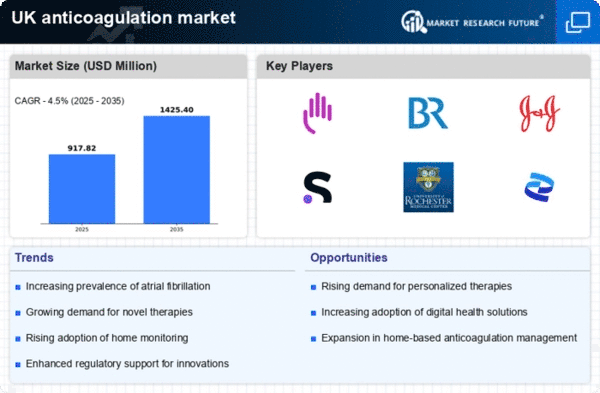Growing Geriatric Population
The increasing geriatric population in the UK is a significant driver of the anticoagulation market. As individuals age, the risk of developing conditions that require anticoagulation therapy, such as atrial fibrillation and deep vein thrombosis, escalates. Current estimates suggest that by 2030, the number of people aged 65 and over in the UK will exceed 20 million, creating a substantial demand for anticoagulant therapies. This demographic shift necessitates a focus on tailored anticoagulation management strategies to address the unique needs of older patients. Consequently, the anticoagulation market is expected to grow as healthcare systems adapt to provide appropriate care for this expanding patient population.
Advancements in Anticoagulant Therapies
Innovations in anticoagulant therapies are significantly influencing the anticoagulation market. The development of novel oral anticoagulants (NOACs) has transformed treatment paradigms, offering patients more convenient options compared to traditional therapies. These advancements not only improve patient adherence but also enhance safety profiles, reducing the risk of bleeding complications. The UK market has seen a notable increase in the adoption of these therapies, with NOACs accounting for over 50% of new prescriptions for anticoagulation. As healthcare providers continue to embrace these innovative treatments, the anticoagulation market is poised for growth, driven by the demand for safer and more effective therapeutic options.
Regulatory Support for Anticoagulant Approvals
Regulatory bodies in the UK are playing a crucial role in shaping the anticoagulation market through streamlined approval processes for new anticoagulant therapies. The Medicines and Healthcare products Regulatory Agency (MHRA) has been proactive in facilitating the introduction of innovative anticoagulants, which has led to a more dynamic market environment. Recent approvals have expanded the range of available therapies, providing healthcare professionals with more options to tailor treatments to individual patient needs. This regulatory support is likely to encourage further investment in research and development, ultimately enhancing the anticoagulation market by introducing new and effective therapies that meet the evolving needs of patients.
Increasing Prevalence of Cardiovascular Diseases
The rising incidence of cardiovascular diseases in the UK is a primary driver for the anticoagulation market. Conditions such as atrial fibrillation and venous thromboembolism are becoming more prevalent, necessitating effective anticoagulation therapies. According to recent data, approximately 1.5 million people in the UK are diagnosed with atrial fibrillation, which significantly increases the risk of stroke. This growing patient population creates a substantial demand for anticoagulants, as healthcare providers seek to manage these conditions effectively. The anticoagulation market is thus expected to expand as more patients require long-term anticoagulation therapy to prevent thromboembolic events. Furthermore, the increasing awareness of the importance of anticoagulation in managing cardiovascular diseases is likely to drive market growth in the coming years.
Increased Awareness and Education on Anticoagulation
There is a growing emphasis on awareness and education regarding anticoagulation therapy among healthcare professionals and patients in the UK. Initiatives aimed at improving understanding of the benefits and risks associated with anticoagulants are becoming more prevalent. This increased awareness is likely to lead to higher rates of diagnosis and treatment for conditions requiring anticoagulation, thereby expanding the market. Educational programs and resources provided by healthcare organizations are instrumental in promoting safe and effective use of anticoagulants. As patients become more informed about their treatment options, the anticoagulation market is expected to experience growth driven by increased demand for anticoagulant therapies.
















